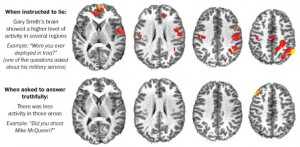 “We discovered that fine-grained patterns of neural activity within the orbitofrontal cortex, an area of the brain associated with emotional processing, act as a neural code which captures an individual’s subjective feeling,”
“We discovered that fine-grained patterns of neural activity within the orbitofrontal cortex, an area of the brain associated with emotional processing, act as a neural code which captures an individual’s subjective feeling,”
purported Adam Anderson, associate professor of human development in Cornell University’s College of Human Ecology and senior author of the study, “Population coding of affect across stimuli, modalities and individuals,” which was published online June 22 in Nature Neuroscience.
This STUDY noted that even though feelings are subjective, our brains turn our emotions into a standard code that objectively represents emotions across different senses, situations and even people
Researchers presented 16 participants with a series of images and tastes and analyzed their brains responses to these subjective experiences via functional neuroimaging. This specialized neuroimaging technology, representational similarity analysis, is able to analyze a the spatial patterns of a person’s brain activity across populations of neurons rather than the traditional approach of assessing activation magnitude in specialized regions.
“It appears that the human brain generates a special code for the entire valence spectrum of pleasant-to-unpleasant, good-to-bad feelings, which can be read like a ‘neural valence meter’ in which the leaning of a population of neurons in one direction equals positive feeling and the leaning in the other direction equals negative feeling,” Anderson explains.
The study was atypically small, but the authors noted that the representation of our internal subjective experience is not confined to specialized emotional centers.
The findings showed that similar subjective feelings – whether evoked from the eye or tongue – resulted in a similar pattern of activity in the OFC, suggesting the brain contains an emotion code common across distinct experiences of pleasure (or displeasure), they say. Furthermore, these OFC activity patterns of positive and negative experiences were partly shared across people.
“Despite how personal our feelings feel, the evidence suggests our brains use a standard code to speak the same emotional language,” Anderson concluded.
